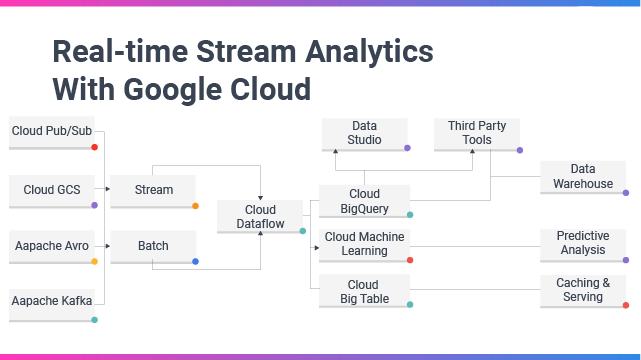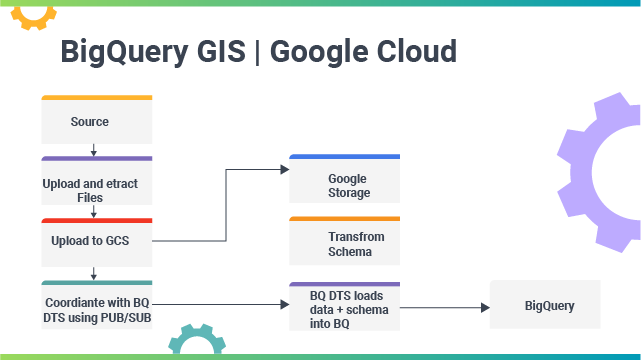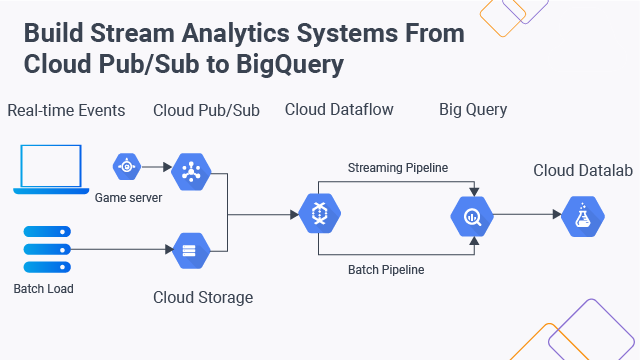Introduction to Stream Analytics
Stream Analytics is the analysis and performing different types of aggregate functions over real-time data, and the continuous query is used for the same. It is connected to an external data source. Stream Analytics System integrates the data and lets one update it or store it in a database etc. Cloud Pub/Sub is a fully managed, real-time messaging service. Cloud Dataflow Pub/Sub enables one to send and receive messages or data between independent applications. Cloud DataFlow is a fully managed service for transforming and enriching data into a stream (real-time or batch) mode with equal trust and expressiveness. It also has a serverless approach to it, which makes it more convenient to use. It also has a Fraud Detection feature for financial services. BigQuery is an enterprise data warehouse. It solves all the problems by enabling superfast SQL queries using the processing power of google’s infrastructure. You can just move your data into BigQuery rest; everything is taken care of.
Google Cloud for Stream Analytics
Google Cloud helps make data coming from Stream Analytics Systems organized, useful, and accessible at the point it is generated. It is built on an autoscaling structure. Streaming with Google cloud (Cloud Dataflow Pub/Sub, Cloud Dataflow, and BigQuery) reduces complexity by providing the exact resources needed for the process, such as ingestion, processing, and analyzing fluctuating volumes of real-time data.
Building resilient streaming analytics systems on GCP helps make stream analytics accessible to both data engineers and data analysts through familiar and straightforward tools. Cloud Streaming architecture often deploys Kafka and spark; Google cloud can bridge, extent, and migrate those solutions through a confluent cloud and cloud dataproc.

Google Cloud Pub/Sub Dataflow
Raw data is the data that is flowing in the current. It can be usable and useful in the current time. It is an up to date data that is consistently accessible. Cloud Pub/Sub is a simple, scalable, and reliable messaging service that streams messages from publishers to subscribers. Users can check the old events with the help of replay. Building resilient streaming analytics systems on GCP also helps provide a straightforward and dependable staging location for your event data on its journey towards processing, analysis, and storage.
Build And Run Stream Analytics
Data Ingestion is the base of analytics and machine learning or building Stream Analytics Systems, batch, etc. Cloud Dataflow Pub/Sub provides the reliable staging location for the user’s event data used for processing, storing, and analyzing the data. Scaling could be done without provisioning using the Cloud pub/sub. Pipelines and applications can be expanded to new regions by simply expanding them with global topics. When used with data flow, Cloud Pub/Sub helps to enrich, deduplicate, order, aggregate, and land events. Cloud Pub/Sub also offers durable storage. The Pub/Sub service is designed to help users focus only on their application rather than any other parameter. Cloud Pub/Sub includes end to end encryption, audit logging, IAM and NoOps, total automated scaling, and unlimited throughput. It also comes with extreme data durability and availability with synchronous cross-zone replication, also comes with native client libraries in significant languages and an open-service API.
Features of Pub/Sub
- At-least-once delivery: It is synchronous and cross-zone message replication and per-message receipt tracking ensures at-least-once delivery at any scale
- Open: Open APIs and client libraries in 7 significant languages support cross-cloud and hybrid deployments.
- Exactly-once processing: Cloud dataflow supports reliable, expressive, exactly-once processing of Cloud Pub/Sub streams Stream Analytics.
- Global by default: One can publish and consume data from anywhere in the world. It offers consistent latency, and no replications are required.
- No provisioning, auto-everything: Cloud Dataflow Pub/Sub doesn’t consist of the shards or partitions. The user just has to set their quota, publish, and consume to be able to work.
- Compliance and security: It offers end-to-end encryption.
- Integrated: User also enjoys the benefits by Google like Cloud Storage, Gmail updates, and cloud functions for Serverless Event-driven Computing.
- Seek and replay: Users can rewind backlog to any point in time or any snapshot; this gives the ability to reprocess the messages. It also allows fasting forward to the discarded outdated data.
Cloud DataFlow for Stream Analytics
Cloud Data flow is a fully managed service used to transform and enrich the data in either stream or batch mode with equal reliability and expressiveness. User does not have to do complicated workarounds or compromises needed. DataFlow comes with its serverless approach to resource provisioning and management. A user has access to limitless capacity to solve the most significant data processing challenges, while they have to pay only for the services they use.
Speed Up The Development Process: Cloud Dataflow supports fast, simplified pipeline development with the help of expressive SQL, Python, and Java APIs in Apache Beam SDK, which helps a great extent with Stream Analytics Systems. Beam also helps the user to reuse their code across streaming and batch pipelines. It also comes with a unified logging and monitoring solution that lets users monitor and troubleshoot their respective pipelines while running. Rich logging, Data Visualization, and advanced alerting help you identify and respond to potential issues.
Simplifies Operations & Management: GCP’s serverless approach helps in enhancing performance, scaling, availability, and security. It handles these things automatically so that the user can focus on programming instead of managing server clusters.
Build on a Foundation for Machine Learning: Cloud Dataflow Pub/Sub can be a convenient integration point to bring predictive analytics to fraud detection, real-time personalization, and more through Google Cloud’s AI Platform and TFX (TensorFlow Extended). TFX uses Dataflow and Beam as a distributed data processing engine to realize various aspects of the ML life cycle.
Use Your Favorite and Familiar Tools: Cloud dataflow seamlessly integrates with services provided by GCP for streaming events ingestion (Cloud Pub/Sub), data warehousing (BigQuery), and more. As cloud dataflow uses a beam, which also lets users use Apache Spark flink and Kafka.
Features of Cloud Dataflow
There are multiple features of Cloud Dataflow among which some of the most common features are as follows:
Automated Resource Management: It automates the entire provisioning and management of the processing resources to minimize latency and maximize utilization.
Exactly-once Processing: Dataflow provides inbuilt support for fault-tolerant execution that is consistent and correct no matter what the size of data or cluster is and regardless of pipeline complexity or processing pattern of the data.
Horizontal Auto-scaling: It means horizontal auto-scaling of worker resources for optimum throughput results.
Unified Programming Model: With the help of Apache Beam SDK, it provides rich MapReduce-like operations and powerful data windowing for streaming and batch data.
Flexible resource scheduling and pricing: It is beneficial for scheduling jobs and running them whenever desired, such as overnight jobs, etc., it helps to lower the price for batch processing and Stream Analytics.
Streaming Data into BigQuery
- It is a serverless and highly scalable cloud data warehouse that is cost-efficient, designed to help the user make informed decisions quickly.
- Accelerate time-to-value with a completely managed and serverless cloud data warehouse. As it is serverless, it is easy for the user to set it up and manage it easily along with Stream Analytics. It requires no database administrator.
- It quickly analyzes petabytes of data. It uses ANSI SQL at blazing-fast speeds.
- It is a secure platform that scales according to the user’s needs.
Key Features
- BigQuery ML: It helps build ML models using pure SQL in a fraction of time.
- BigQuery BI Engine (beta): It is an in-memory analysis service that is blazing fast. It allows users to analyze over a range (broad) datasets interactively and in a matter of few seconds
- BigQuery GIS: It helps to combine the serverless architecture of BigQuery with support for geospatial analysis, making BigQuery the only cloud data warehouse with built-in GIS functionality.

Best Features of Big Query
Serverless: Serverless data warehousing lets google do all the resource provisioning behind the scenes. In return, it helps users stay focused on the data and analysis without worrying about anything related to the infrastructure of the data. warehouse
Real-time Analytics: High-speed insertion API of BigQuery provides a great deal of help for real-time analytics. Users can also make Cloud Dataflow Pub/Sub to stream data directly into BigQuery.
Automatic High Availability: It automatically provides highly durable and replicated storage in multiple locations and high availability without charging extra for the same features. Standard SQL – BigQuery supports standard SQL dialect. It also provides ODBC and JDBC drivers at no extra cost.
Automatic Backup and Easy Restore: BigQuery automatically replicates all the data present and keeps a seven-day history of changes. This helps the user to restore or compare the data at different times.
GeoSpatial Data Types and Functions: BigQuery also provides the service used for geospatial analytics. BigQuery GIS provides SQL support lines, points, polygons, and so on.
Data Transfer Service: BigQuery automatically transfers data from any external data source, like Google Marketing Platform, Google Ads, etc. Users can quickly move from AmazonS3 and Teradata to BigQuery.
Petabyte Scale: Users can easily store and perform over petabytes to exabytes of data stored with ease.
Data Governance and Security: BigQuery provides strong governance and security, Identity, Access Management, Stream Analytics; it also keeps user’s data encrypted at rest all the time. Vibrant monitor and logging with Stackdriver – BigQuery also comes with rich logging, alerting, and monitoring with Stackdriver Audit Logs.



